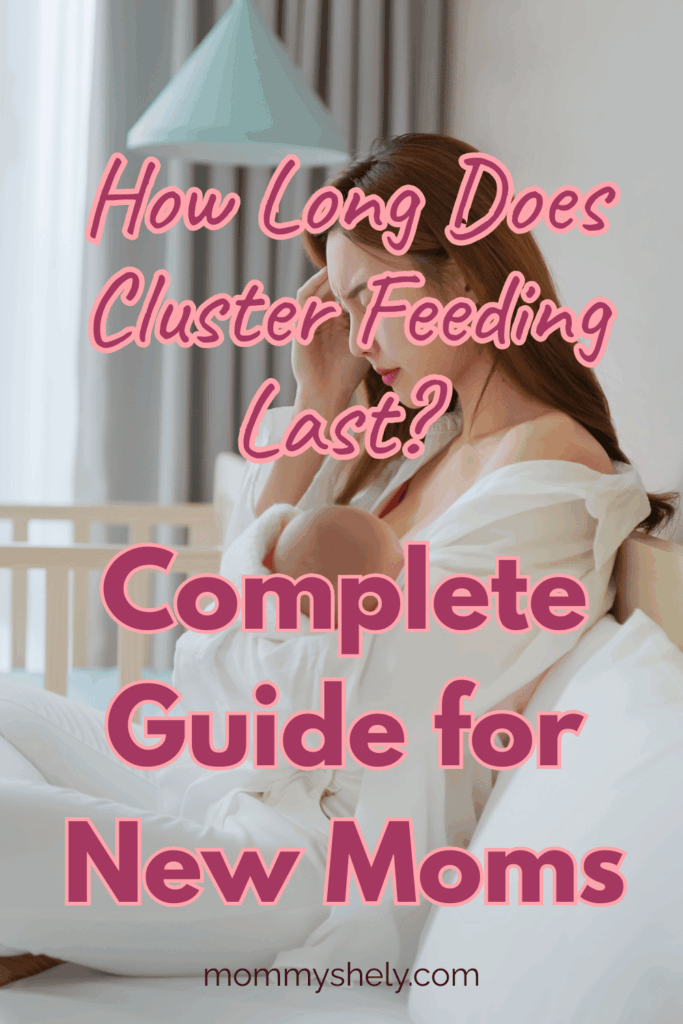How long does cluster feeding last? Most cluster feeding episodes last 2-3 days during each growth spurt. Your baby will feed every 30-60 minutes for several hours (usually 2-6 hours per day), and then things return to normal until the next growth spurt.
If your newborn is feeding every 30-45 minutes for hours at a time, you’re experiencing cluster feeding.
And while it’s exhausting, it’s completely normal. It’s actually your baby’s natural way of boosting your milk supply and getting comfort during rapid growth periods.
I’ve been through it with both of my babies. With Liam, I was overwhelmed and convinced something was wrong with my milk supply. With Emily, I recognized it early, braced myself, and managed the experience better. Netflix and snacks became my best friends during those marathon nursing sessions!
Whether this is your first time hearing the term or you’re in the middle of a feeding marathon right now, this post is here to help you learn exactly when cluster feeding starts, how long each episode lasts, what it looks like hour by hour, and how to survive those marathon nursing sessions.
Pin For Later!

What Is Cluster Feeding?
Cluster feeding is when your baby feeds frequently in a short period, sometimes every 30 to 45 minutes, for several hours at a time.
What makes cluster feeding feel so intense is the lack of a break. Just when you think your baby is full and satisfied, they’re back on your chest rooting for more. This behavior can be surprising, especially if you’ve just settled into what felt like a consistent feeding routine.
Key Characteristics:
- Feeding every 30-60 minutes for 2-6 hours straight
- Most common in late afternoon/evening (4pm-10pm)
- Baby seems unsettled between feeds
- Happens during growth spurts
- More common in breastfed babies (but formula-fed babies experience it too)
Here’s the one thing I want you to remember from this post: Cluster feeding is NOT a sign that something is wrong with your milk supply or that your baby isn’t getting enough milk. It’s actually the opposite, it’s how your body makes MORE milk.
When Does Cluster Feeding Start?
Cluster feeding can start as early as day 2 of your baby’s life. Yes, that soon!
Many moms experience their first cluster feeding session while still in the hospital or within the first few days at home. This early cluster feeding actually serves an important purpose: it helps transition your colostrum into mature milk and establishes your milk supply.
Timeline of When Cluster Feeding Starts
First Week of Life:
- Day 2-3: Often the first intense cluster feeding (coincides with Second Night Syndrome)
- Days 4-7: Continues as your milk comes in and supply establishes
- This early phase helps your body understand how much milk to produce
Throughout the First Year:
Cluster feeding then returns during key growth spurts, and often happens around developmental milestones.
- Around week 1
- Weeks 2-3
- Week 6
- 3 months
- 6 months
So to answer “when does cluster feeding start”, it can begin almost immediately after birth and recur throughout your baby’s first year during growth spurts.
Keep in mind, ach baby is unique, so your baby may follow a slightly different timeline. But if you suddenly find yourself feeding almost constantly during one of these windows, chances are it’s a growth spurt, and cluster feeding is how your baby signals it.
How Long Does Cluster Feeding Last? (Detailed Timeline)
The good news? Cluster feeding doesn’t last forever. Here’s the breakdown of how long cluster feeding lasts at different stages:
Per Episode (During Each Growth Spurt):
2-3 days is typical, though some babies may cluster feed for up to 5 days. Each episode usually follows this pattern:
- Day 1: Cluster feeding begins, often catching you by surprise
- Days 2-3: Peak intensity – this is the hardest part
- Day 4-5: Feeding patterns start returning to normal
During Each Session:
When your baby is actively cluster feeding, expect:
- 2-6 hours of frequent feeding (usually in the evening)
- Feeds every 30-60 minutes during this window
- Each individual feed lasting 10-30 minutes
First Few Weeks:
The first 2-3 weeks are often the longest continuous period of cluster feeding. During this time, you may feel like cluster feeding is almost constant because episodes happen so close together. This is your body building your milk supply to meet your baby’s needs.
After 3 Months:
Cluster feeding episodes become less frequent and less intense as your milk supply stabilizes and your baby’s stomach can hold more milk per feeding.
If it feels like it’s dragging on for more than a week, or your baby seems unusually fussy or tired, it’s a good idea to check in with your pediatrician or lactation consultant just to rule out anything else.
When Does Cluster Feeding End?
While cluster feeding can technically happen throughout the first year during growth spurts, most parents notice it becomes much less intense after 3-4 months. By 6 months, cluster feeding episodes are rare and brief.
The complete end of cluster feeding varies by baby, but most will have outgrown it by 6-9 months as they begin eating solid foods and their feeding patterns mature.
What Does Cluster Feeding Look Like? (Hour-by-Hour Examples)
Understanding what cluster feeding actually looks like can help you recognize it and feel less overwhelmed.
Here are real examples:
Sample Evening Cluster Feeding Session
For a Breastfed 2-Week-Old:
| Time | Activity |
|---|---|
| 4:00 PM | Feed for 15 minutes, baby seems satisfied |
| 4:45 PM | Baby rooting again, feed for 10 minutes |
| 5:30 PM | Another feed, 15 minutes, baby fussy |
| 6:15 PM | Feed for 20 minutes |
| 7:00 PM | Short 10-minute feed |
| 7:45 PM | Comfort feed for 15 minutes |
| 8:30 PM | Final feed, 20 minutes, baby falls asleep |
| 8:30 PM – 12:30 AM | Baby sleeps for 4-hour stretch |
Total: 4.5 hours of cluster feeding, followed by longer sleep
24-Hour Cluster Feeding Schedule Example
Breastfed Newborn (2-3 Weeks Old):
| Time | Type | Notes |
|---|---|---|
| 12:00 AM | Normal feed | 20 minutes |
| 3:00 AM | Normal feed | 15 minutes |
| 6:00 AM | Normal feed | 20 minutes |
| 9:00 AM | Normal feed | 15 minutes |
| 12:00 PM | Normal feed | 20 minutes |
| 2:00 PM | Normal feed | 15 minutes |
| 4:00 PM | Cluster begins | 15 minutes |
| 5:00 PM | Cluster feed | 10 minutes, fussy |
| 6:00 PM | Cluster feed | 15 minutes |
| 7:00 PM | Cluster feed | 20 minutes |
| 8:00 PM | Cluster feed | 10 minutes |
| 9:00 PM | Cluster ends | 20 minutes, deep sleep follows |
Bottle-Fed Baby Cluster Feeding (1 Month Old):
| Time | Type | Amount |
|---|---|---|
| 6:00 AM | Normal bottle | 3-4 oz |
| 9:00 AM | Normal bottle | 3-4 oz |
| 12:00 PM | Normal bottle | 3-4 oz |
| 3:00 PM | Normal bottle | 3-4 oz |
| 5:00 PM | Cluster feed | 2 oz |
| 6:00 PM | Cluster feed | 1 oz |
| 7:00 PM | Cluster feed | 2 oz |
| 8:30 PM | Cluster feed | 1 oz |
| 10:00 PM | Normal bottle | 3-4 oz |
Note: Cluster feeding bottles are typically smaller and more frequent
Signs of Cluster Feeding: How to Tell
Not sure if your baby is cluster feeding or if something else is going on? Here are the telltale signs:
Clear Signs Your Baby is Cluster Feeding:
- Frequent feeding in a specific time window (especially 4pm-10pm)
- Baby wants to feed 30-60 minutes after finishing a full feeding
- Pattern lasts 2-3 days then returns to normal
- Baby is gaining weight appropriately
- You’re getting 6+ wet diapers per day
- Baby is alert and content at other times of day
- Happens during known growth spurt ages (2-3 weeks, 6 weeks, 3 months)
- Baby seems to “tank up” then sleeps longer afterward
- Baby is fussy if removed from breast but calms when nursing
- Rooting and hunger cues are strong and frequent
Cluster Feeding vs. Normal Feeding Patterns
| Normal Feeding | Cluster Feeding |
|---|---|
| Every 2-3 hours | Every 30-60 minutes |
| Consistent throughout the day | Concentrated in specific time periods (usually evening) |
| Baby settles after feeding | Baby wants to feed again immediately |
| Predictable routine | Unpredictable, intense periods |
| Happens daily | Happens during growth spurts (2-3 days at a time) |
| Even spacing between feeds | Multiple feeds bunched together |
| Baby satisfied between feeds | Baby fussy/unsettled until next feed |
Why Do Babies Cluster Feed?
Understanding WHY babies cluster feed can help you feel more confident during those long nursing sessions:
1. To Boost Your Milk Supply
This is the primary reason! The more your baby nurses, the more milk your body produces. It’s supply and demand, your baby is literally telling your body “make more milk!”
Research shows that frequent nursing increases milk supply through supply and demand principles.
2. For Comfort and Regulation
Feeding isn’t just nutrition. Your breast provides:
- Temperature regulation through skin-to-skin contact
- Heart rate stabilization
- Emotional security and bonding
- Stress relief for baby
3. During Rapid Growth Spurts
Your baby’s body is growing incredibly fast. During these periods, they need:
- Extra calories for physical development
- More frequent nutrition as their metabolism accelerates
- Additional comfort during developmental changes
4. To Prepare for Longer Sleep
Many babies “tank up” before a longer sleep stretch. Cluster feeding in the evening often leads to a 4-6 hour sleep period afterward.
5. Natural Daily Rhythm
Breast milk composition changes throughout the day. Evening milk has higher fat content and sleep-inducing hormones. Babies instinctively cluster feed at this time to:
- Get calorie-dense milk
- Stimulate sleepiness hormones
- Wind down from the day
6. Developmental Leaps
When babies are learning new skills (rolling, sitting, crawling), their brains work overtime. Cluster feeding provides:
- Extra brain-building nutrition
- Comfort during overwhelming developmental periods
- Connection during times of rapid change
Is Cluster Feeding a Problem?
No. While exhausting, cluster feeding is not a problem.
It doesn’t mean your baby isn’t getting enough milk, and it doesn’t mean your supply is low!
In fact, if your baby is gaining weight, has enough wet diapers, and is otherwise healthy, cluster feeding is simply a phase! Not a sign that something’s wrong.
That said, if your baby is feeding constantly around the clock without breaks, isn’t producing enough wet diapers, or seems lethargic, it’s a good idea to talk to your pediatrician or lactation consultant to rule out other issues.
Can Formula-Fed Babies Cluster Feed?
Yes! Formula-fed babies cluster feed too, though it looks slightly different.
What Formula-Fed Cluster Feeding Looks Like:
- Smaller bottles more frequently
- Wanting bottles 1-2 hours apart instead of 3-4 hours
- Taking 1-2 oz instead of full 3-4 oz bottles
- Increased fussiness during usual cluster feeding times
- Demanding feeds at unusual times
Tips for Cluster Feeding Formula-Fed Babies:
- Follow your baby’s hunger cues
- Offer smaller amounts more frequently
- Don’t force them to finish bottles
- Use paced bottle feeding to prevent overfeeding
- Burp frequently between cluster feeds
- Offer extra comfort through holding and skin-to-skin
Combo Feeding (Breast + Formula):
If you’re combo feeding, your baby may still cluster feed at the breast while taking bottles at other times. This is normal and can help maintain your milk supply during growth spurts.

How to Survive Cluster Feeding: Practical Tips
Cluster feeding can feel never-ending in the moment, but it doesn’t last forever. I promise!
Here are the strategies that helped me get through cluster feeding with both my babies:
1. Set Up a Feeding Station
Create a comfortable spot with everything within reach:
- Large water bottle (refill it constantly!)
- High-protein snacks (nuts, cheese, energy bars)
- Phone charger
- TV remote or tablet loaded with shows
- Nursing pillow
- Burp cloths
- Blanket for you
- Reading material
You’ll be there for hours, make it comfortable!
2. Stay Hydrated and Well-Fed
Your body is working overtime. You need:
- Extra 300-500 calories per day
- 8-12 glasses of water minimum
- Nutrient-dense foods readily available
- Water bottle with you at ALL times
I kept a snack basket next to my nursing chair and a water bottle in every single room.
3. Try Babywearing
A soft carrier was a LIFESAVER for me. It:
- Frees your hands for other tasks (especielly if you have another child)
- Keeps baby close for frequent feeds
- Allows you to eat, use bathroom, care for older kids
- Can help baby doze between cluster feeds
4. Lower Your Expectations
During cluster feeding days:
- Let the dishes sit
- Order takeout
- Skip chores
- Don’t answer non-urgent messages
- Cancel plans if needed
Your only job is feeding your baby. Everything else can wait.
5. Accept All Help
Even though you’re the one feeding, others can:
- Bring you meals and water
- Do household chores
- Care for older siblings
- Give you shoulder massages
- Handle diaper changes between feeds
- Run errands
- Let you shower during baby’s brief nap
Don’t be a martyr! Let people help!
6. Rest When Possible
Cluster feeding often leads to longer sleep stretches. When baby sleeps:
- Lie down, even if you can’t sleep
- Close your eyes and rest
- Skip chores! Seriously, REST
- Take a 20-minute power nap if you can
7. Switch Feeding Positions
Sitting in one position for hours is painful. Try:
- Side-lying nursing (my all time favorite position)
- Laid-back/reclined position
- Football hold
- Switching sides frequently
- Standing and swaying while nursing
8. Use Nipple Care
Frequent feeding can cause soreness:
- Apply nipple cream or lanolin after feeds
- Air dry nipples when possible
- Use hydrogel pads for relief
- Wear soft, breathable bras
- Check latch if pain is severe
9. Find Your Entertainment
Make the time more bearable:
- Download a new show
- Start an audiobook
- Call a friend (hands-free!)
- Scroll social media guilt-free
- Online shop (dangerous but fun!)
- Plan your next vacation
- Whatever makes you happy!
With Liam, I watched an entire TV series during his cluster feeding weeks. With Emily, I listened to podcasts. Find what works for you!
10. Remember It’s Temporary
This was my mantra: “This is just 2-3 days. I can do anything for 2-3 days.”
Keep reminding yourself:
- This WILL end
- You’re doing exactly what your baby needs
- The longer sleep that follows is worth it
- You’re building your milk supply for easier days ahead
When to Seek Help
Contact your pediatrician or lactation consultant if:
- Cluster feeding continues for more than a week straight
- Fewer than 6 wet diapers per day (after day 5 of life)
- Baby seems lethargic or too weak to feed
- Baby isn’t gaining weight or is losing weight
- You have severe, ongoing nipple pain
- Baby has yellow or green vomit
- Signs of dehydration
- You feel overwhelmed, hopeless, or unable to cope
- Your instinct tells you something isn’t right
Trust your gut. It’s always better to ask for help than suffer in silence.
Cluster feeding can make you doubt everything. When you’re four hours into marathon nursing, it’s easy to think something must be wrong.
But here’s the truth: You’re not doing anything wrong.
Your baby is doing exactly what nature designed them to do. Your body is responding perfectly. This exhausting, overwhelming experience is actually evidence that everything is working exactly as it should.
The question “how long does cluster feeding last” has a concrete answer: 2-3 days per episode, with intensity decreasing after 3-4 months. When you’re in the middle of hour five of feeding, remember—this specific episode will be over in a day or two.
I promise you, one day you’ll look back on these cluster feeding marathons with a strange sort of nostalgia. That tiny baby who couldn’t be separated from you will become a toddler who runs away the moment you sit down. These exhausting, endless feeding sessions are actually fleeting moments of pure connection with your newborn.
Lean into it, ask for help when you need it, and remember: you’re in the hardest part of the hardest job. And you’re absolutely crushing it.
If you’re currently in the thick of cluster feeding, I see you. You’re doing an amazing job. Keep going – you’ve got this.
With love,
Shely



